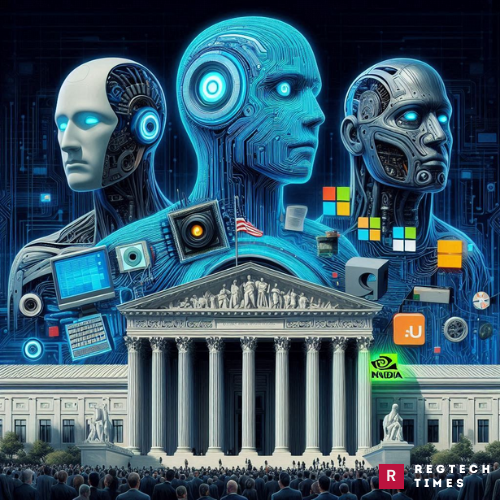The U.S. Justice Department (DOJ) and the Federal Trade Commission (FTC) have reached a pivotal agreement that clears the path for antitrust investigations into the dominant roles that Microsoft, OpenAI, and Nvidia play in the artificial intelligence (AI) industry. This move highlights the increasing regulatory scrutiny over the concentration of power in the AI sector and highlights the concerns about competition and market dynamics.
Rising Dominance of Nvidia in AI
The AI industry has seen rapid advancements and significant investments, particularly from tech giants like Nvidia. Nvidia controls approximately 80% of the AI chip market, which includes the custom processors used by major cloud computing companies such as Google, Microsoft, and Amazon. This dominance has enabled Nvidia to report gross margins between 70% and 80%, making it a critical player in the AI hardware landscape.
Microsoft’s Strategic Investments in AI
Microsoft has made substantial investments in AI software and services. Its $13 billion investment in OpenAI, giving it a 49% stake in the for-profit subsidiary of the nonprofit OpenAI, exemplifies the depth of its commitment to leading in AI. Microsoft’s involvement with OpenAI has positioned it at the forefront of developing cutting-edge AI models, further cementing its influence in the industry.
FTC’s Focus on OpenAI and Microsoft’s AI Activities
Under the new agreement, the DOJ will take the lead in investigating Nvidia, while the FTC will focus on Microsoft and OpenAI. This division of responsibilities is reminiscent of the 2019 agreement between the two agencies to divide enforcement actions against Big Tech, which resulted in ongoing cases against Meta, Amazon, Apple, and Google.
Key Concerns Surrounding Microsoft, OpenAI, and Nvidia
The regulators’ decision to scrutinize these companies stems from several key concerns:
Market Dominance: Nvidia’s control over the AI chip market and Microsoft’s significant investments in AI raise questions about potential anticompetitive practices and market concentration.
Data and Computational Power: AI development requires vast data and vast computational resources. Dominant firms with substantial resources may gain further advantages, potentially stifling competition and innovation.
Partnerships and Mergers: The FTC is particularly interested in examining whether Microsoft’s deals, such as its $650 million agreement with Inflection AI, are being used to circumvent merger disclosure requirements. This deal allowed Microsoft to use Inflection’s models and hire most of its staff, including co-founders, raising concerns about competitive fairness.
Broader Implications for the AI Industry
This regulatory scrutiny is part of a broader trend where U.S. antitrust enforcers are increasingly concerned about the power and influence of Big Tech companies, especially in emerging fields like AI. The outcome of these investigations could have significant implications for the future of the AI industry, potentially reshaping how AI technologies are developed, deployed, and regulated.
Industry Reaction from Microsoft, OpenAI, and Nvidia
Spokespersons for Nvidia and OpenAI have declined to comment on the agreement. However, Microsoft has stated that it takes its legal obligations seriously and is confident that it has complied with all reporting requirements. This cautious response indicates the high stakes involved for these companies as they navigate the regulatory landscape.
Regulatory Actions and Future Steps for Microsoft, OpenAI, and Nvidia
The FTC’s previous actions, such as the January order for OpenAI, Microsoft, Alphabet, Amazon, and Anthropic to provide information on recent AI investments and partnerships, highlight the proactive stance of the regulators. Additionally, the FTC’s investigation into OpenAI’s compliance with consumer protection laws points to a broader regulatory effort to ensure that AI advancements do not come at the expense of consumer rights and data privacy.
Last week, DOJ antitrust chief Jonathan Kanter emphasized the importance of scrutinizing the AI industry, noting the significant advantages that large firms gain from their access to data and computing power. This feeling reflects a growing realization of the possible risks associated with the concentration of power in the hands of a few dominant players.
The Future of AI: What’s Next for Microsoft, OpenAI, and Nvidia?
The agreement between the DOJ and FTC to investigate Microsoft, OpenAI, and Nvidia marks a crucial step in addressing the competitive dynamics of the AI industry. As regulatory scrutiny intensifies, the tech giants at the forefront of AI innovation may face increased oversight and potential legal challenges. The outcome of these investigations could lead to significant changes in the AI landscape, fostering a more competitive and equitable environment for all players in the industry.
The antitrust probes into Microsoft, OpenAI, and Nvidia highlight the growing regulatory concerns about the concentration of power within the AI industry. As these investigations unfold, they will not only shape the future of these companies but also set important precedents for the broader technology sector. Ensuring a competitive landscape in AI is essential for innovation, consumer protection, and the overall health of the digital economy. The actions taken by the DOJ and FTC are pivotal in striving for a balanced and fair AI ecosystem.


